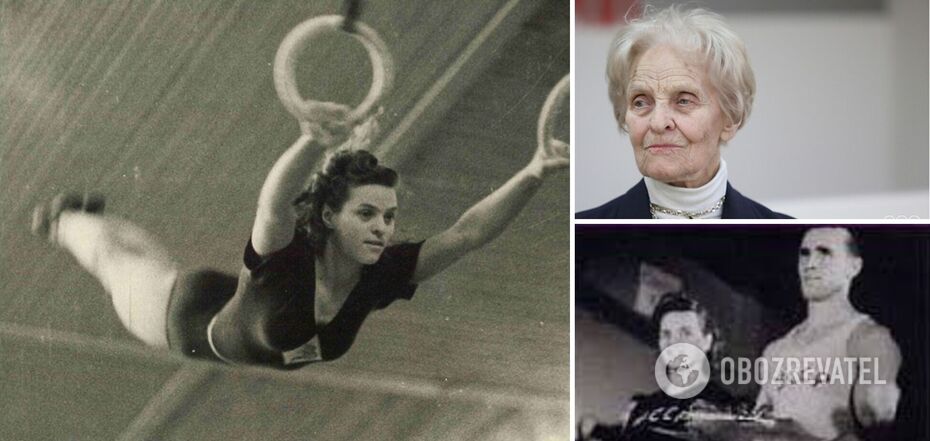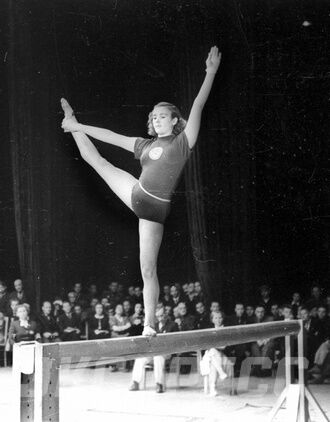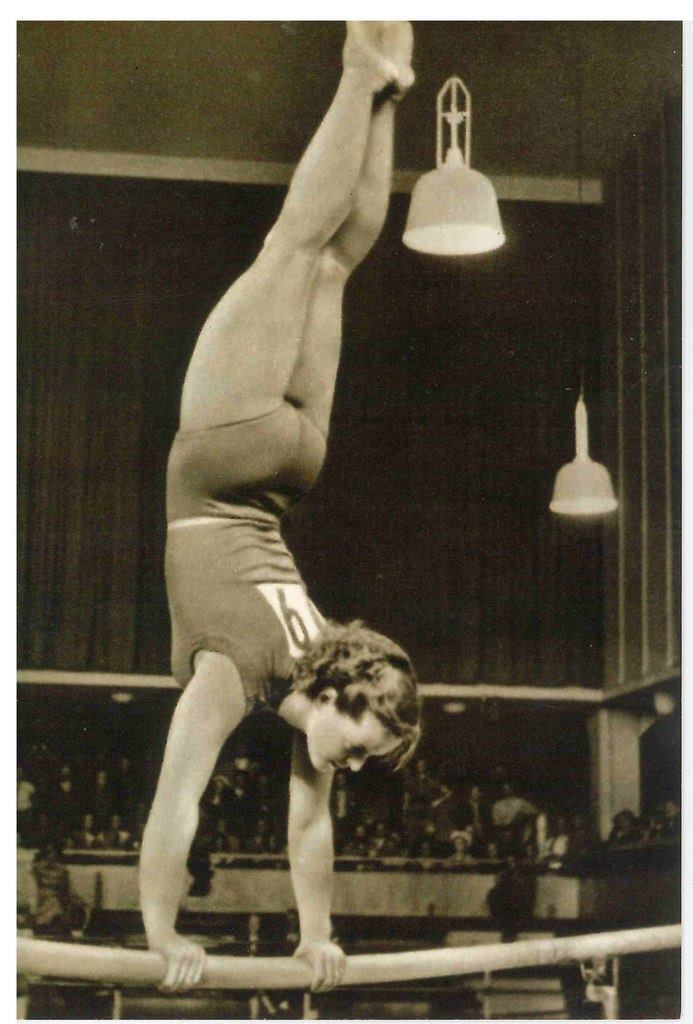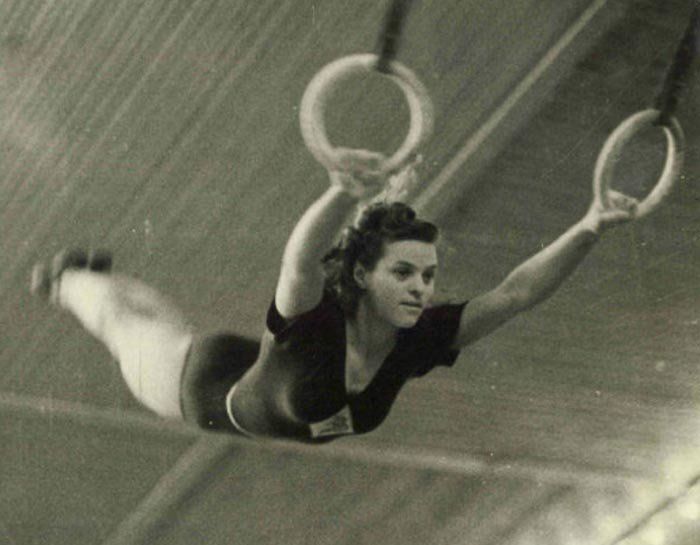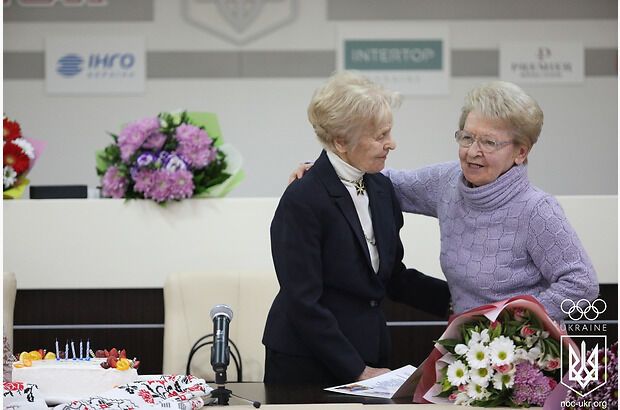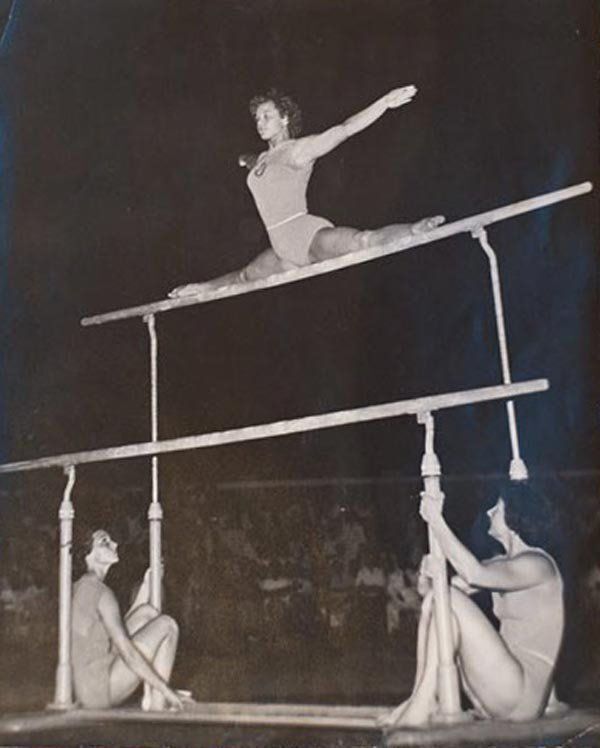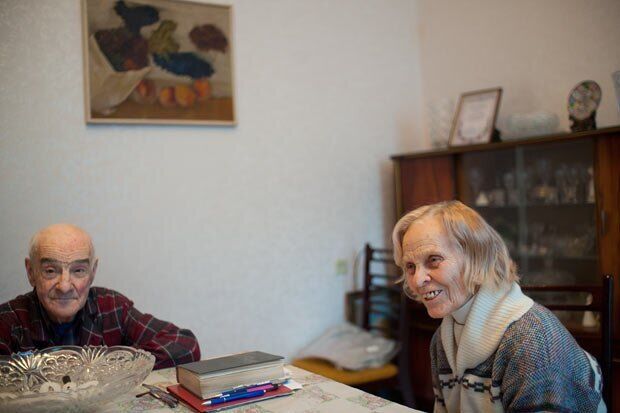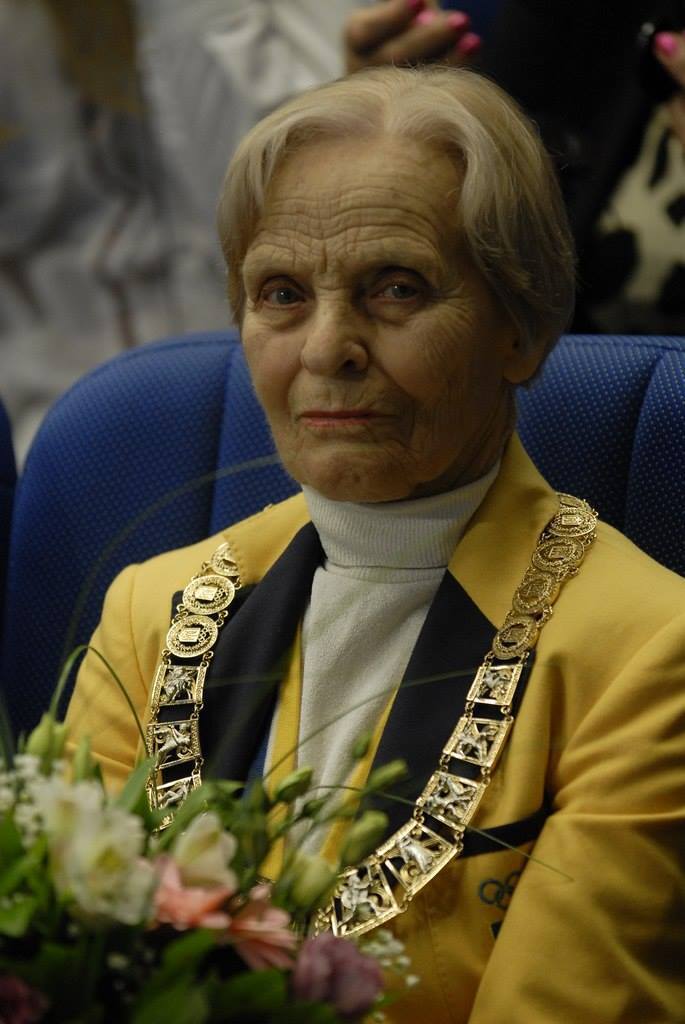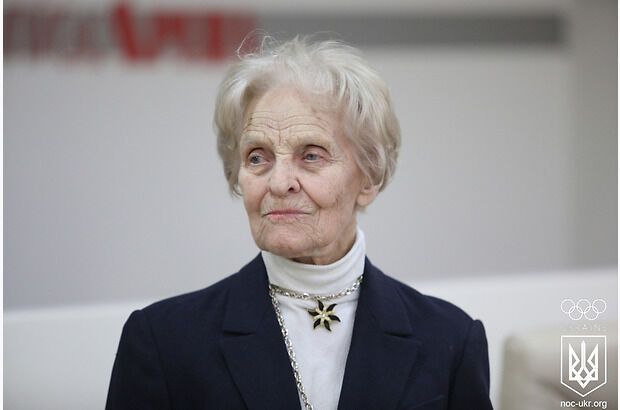Sport
Legendary Ukrainian gymnast stole to survive, won a place at the Olympics, and waited to meet Stalin: the story of the first champion
100 years ago, on September 24, 1924, the legendary gymnast Nina Bocharova was born - a graceful Ukrainian woman with an iron will and a strong character, bold and fearless. She survived the famine of the 1930s and the war, when she had to steal to live, and then invented a new element and became a two-time Olympic champion at the first Summer Games for the USSR in 1952.
OBOZ.UA recalled the most interesting facts about an extraordinary woman who survived in the most difficult situations and remained true to her principles. It is also believed that Bocharova became the first Ukrainian winner of the Olympic Games, as Gorokhovska played for Leningrad in Helsinki.
A TERRIBLE FAMINE. Bocharova comes from the village of Suprunivka near Poltava, so she knows firsthand what the terrible famine organized by the Soviet government in the 1930s in Ukraine was like. Nine-year-old Nina had to steal carrots from the collective farm fields, otherwise her family would not have survived.
As the champion later recalled, her mother somehow managed to make pancakes from millet husks and find potato peels from somewhere. The hunger was terrible, so they even had to hunt crows, at which they threw sticks, but only brought down sparrows. She and her family were not cruel, they just had to survive. It got to the point where the future athlete's five-year-old sister was almost taken for "meat."
"They promised her something and almost took her away. I also remember my husband lying dead in the street. And we, three kids, managed to drag him on the barbed wire to the well and throw him in. We had no strength to bury him. Apparently, he is still lying there. It was scary, of course," the champion admitted in an interview with LB.
But Bocharova survived, and soon gymnastics appeared in her life. The section was located in Poltava, and for the sake of it, the girl had to travel several kilometers one way every day to train. But since childhood, Nina was not used to giving up and caving in to difficulties. She attended every class.
In addition, she told us that in Poltava, she used to come down from Panyanska Hill to class and still manage to hoe potatoes. The champion attributed her physical strength not only to her ability to work, but also to her genetics, saying that she inherited her strength from her father, who was a blacksmith.
In 1938, Bocharova became the Ukrainian champion in artistic gymnastics among middle-aged girls, and the following year she made her debut in the RSFSR adult championship, but then had to forget about the competition because of World War II.
The titled gymnast did not like to talk about thewar, although she noted that she had been to Kharkiv and Kalach, where she carried grenades to the partisans and almost died. At that time, she worked as an acrobat for the Poltava circus of wrestler Ivan Shemiakin. A year after the liberation of Poltava, in the fall of 1944, she traveled to Kyiv to enter the Institute of Physical Education.
Even though it was already October, enrollment in the infirmary was in full swing, because the war had caused a catastrophic shortage of people. They took 20-year-old Nina as well: "I was doing a bend-up, and they said: "You're a good fit for us."
"There were 105 of us, and only three boys. And I went with them to the station to unload the wagons. I was a strong girl. All my childhood I played with boys, and soccer too. I also took the tram with the girls to Pushcha-Vodytsia to load 8-meter logs, because we had to eat. We also rebuilt Khreshchatyk. Every Saturday we went to the Passage to clear the rubble," the gymnast recalled.
Back then, students received a 230-ruble scholarship, and a bar of soap cost half that. So we had to not only study, but also work hard. They even had to do some labor. And in the conditions of severe shortages and lack of heating, even steal: "We stole a stove somewhere, stole fence boards from our private neighbors. But the smoke exhaust to the stove was done incorrectly, and as a result, the gymnasium caught fire. They stole potatoes from the teaching staff."
FIRST IN THE USSR. It was not easy in the postwar period either, but this struggle for survival did not prevent Bocharova from improving her skills, and in 1949 she won the absolute championship at the USSR Championship in Kyiv.
Later, the gymnast recalled that it was the birthday of the head of the USSR, so she had to say on the radio: "I dedicate my victory in honor of Comrade Stalin's 70th birthday." But even after Ukrainian school, it took Bocharova until the third take to pronounce the seventieth birthday.
"Nina would wake me up every morning at half past six in the morning, and we would go on the log until half past seven," said Olena Huts, a friend of the future champion, a former gymnast.
"I was very fond of the balance beam, and I loved balance in general, not just in sports. I was always walking on logs, on ledges... That's probably why I won the Olympics on a log. It was incredibly difficult to get into the USSR team from Ukraine. They had the following attitude: "Well, what about Ukraine..." You had to be no lower than number one or two. But this is not athletics, where you have meters and seconds. In gymnastics, everything is visual - you either like it or you don't. One person gave me a score of 9.8, and the other 8.3 - it happened to me too," Nina Antonivna emphasized in an interview with xsport.ua.
In addition, Bocharova came up with her own element - a cross splits on the uneven bars, which no one had dared to perform before her. For stability, the apparatus was supported from below by other gymnasts: "I liked the fact that it was dangerous. And the element went well. I won many times on the uneven bars too. No one has done it after me."
OLYMPIC PRESSURE. The Ukrainian gymnast was generally risky and even daring. In 1952, she was to compete as a member of the USSR national team at the first Olympic Games in Helsinki. At the last inspection before leaving for Finland, Bocharova decided to show the sports officials a new jump. And she made a mistake.
The members of the commission were shocked, because the national team's number one was not ready for the most important competition. They had to listen to Nina Antonivna for a long time, but in the end she promised not to perform her daring jump, but to win gold and silver medals for the country: "If you only knew how much they mocked me. But I have great satisfaction in the fact that I promised to win two medals and kept my word."
In Helsinki, the 28-year-old Ukrainian became the champion in the floor exercise and in the team competition, while in the individual and team apparatus events she was content with silver. In the all-around, she lost to another native of Ukraine, Maria Gorokhovsky. And they say that later she regretted not performing that new jump at the Olympics - no one would have taken away the gold medal from the Poltava girl.
By the way, when Bocharova saw Helsinki during the Games, she realized how big a difference there was between life in the USSR and behind the Iron Curtain. Even compared to Moscow, Finland has already made much more progress. For the first time, the athlete saw small cleaning machines, and logs were lifted on tartars with special "tongs" instead of by hand.
HANDBAG FOR STALIN. Bocharova received nothing for her four medals at the Olympics, as sports in the USSR were considered amateurish, and she was listed as a teacher of Ukrainian language and literature.
Moreover, after returning to the Soviet Union, none of the party leadership bothered to meet with the athletes who had won 71 awards. And they were preparing for a meeting with Stalin; the gymnasts even bought new handbags. Instead, however, Bocharova and Olympic champion gymnast Viktor Chukarin spent the entire day at the Moscow train station waiting in line for tickets to Kyiv and Lviv, respectively.
However, Bocharova did not wait for the next Olympics. In 1954, at the age of 30, she won the world title, and then decided to end her career. And she left the platform surprisingly easily, taking a job as a coach at the Kyiv Children's and Youth Sports School No. 2.
Unlike many of her colleagues, Bocharova was happily married for almost 60 years. Her chosen one was Arkady Semenovich Feldman, an honored gymnastics coach of Ukraine. The couple's relationship began in 1956, and they got married in 1963.
"But we could have gotten together back in 1956, when we were walking together from the old Palace of Physical Education. It was the first time I had ever seen her. She was exquisitely dressed, even today she would be a Parisian: a tight figure, 12-centimeter heels, which no one in Kyiv wore. In Sevastopol, in the 1970s, a doorman did not let her into a restaurant with such a heel," Feldman recalled.
In general, Nina Antonivna was known as a great fashionista and knew how to emphasize her figure. And in 1954, while the national team was at the World Cup in Italy for two weeks, the Ukrainian prima managed to sew herself a fur coat. And her high-heeled shoes were made to order in Kyiv.
"Dynamo" and the 5 a.m. charge. Although Nina Antonivna and her husband had quite different personalities, they were definitely united by their love of football at Dynamo Kyiv. They regularly went to the stadium and attended Lobanovsky's funeral.
On one of the anniversaries, the players of the capital's club presented their star fan with a rare ball signed by such legends as Lobanovsky, Serebryanykov, Biba, and Troyanovsky. But in the 90s, the family had no money, and it had to be sold for $10.
At the age of 55, Bocharova, who was then a member of the Spartak sports association's board, retired from sports for good. Although it was just before the 1980 Moscow Olympics, and the management even offered the famous gymnast a car to postpone her retirement. But Nina Antonivna refused.
In 2004, Bocharova was honored to be the first to carry the Olympic torch on Ukrainian soil. Throughout her life, Nina Antonivna kept herself in shape, and during the celebration of her 95th birthday, she said: "I used to do a 5 a.m. log, and now I do exercises at 5 a.m. However, not very strong, of course, my doctors don't allow me to do it."
And on August 30, 2020, in Rome, the legendary gymnast and incredibly strong woman who went through terrible moments but emerged victorious from all the troubles passed away.
Only verified information is available on the OBOZ.UA Telegram channel and Viber. Do not fall for fakes!


